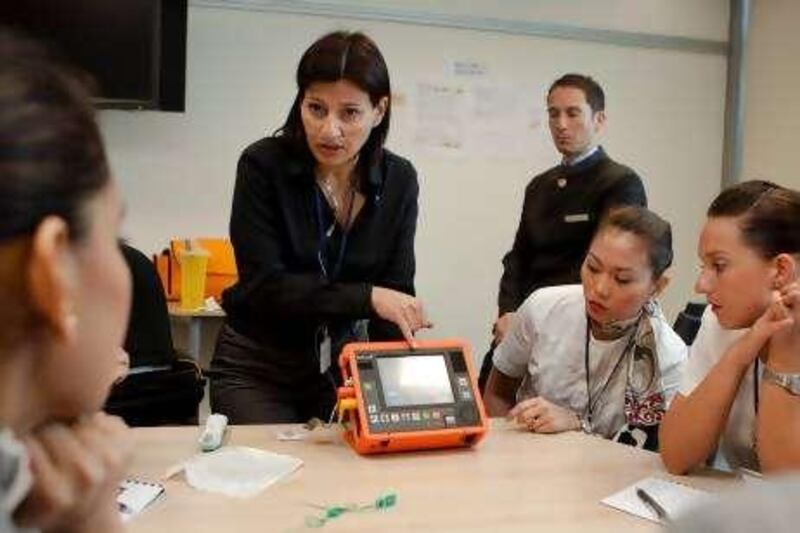When you are in a plane flying at an altitude of 35,000 feet, the last thing you want is to fall ill, especially as there may be no doctor or nurse on board.
Luckily, those who think airline cabin crew are better trained to serve drinks than save lives are much mistaken. With more passengers and longer flights the crew needs to be prepared for anything - including medical emergencies. "By teaching the crew new skills you are empowering them," says the senior Etihad trainer Aline Abdou, from Lebanon. "The profile of people has changed, there are more old people and more sick people who travel. And the flights are getting longer."
The Gulf region in particular, she says, sees a significant number of expatriate passengers travelling home for medical care. Fortunately, both the equipment available and level of staff training have increased dramatically over the past decade and modern crews are prepared for almost anything. Common problems include fainting, diarrhoea and vomiting, but more serious - and thankfully more rare - issues include chest pains, difficulty breathing and even heart attacks.
"The perception is that you do the service and give people drinks and food," Ms Abdou says. "A lot of people who see the medical training the crew go through are amazed by the level of education. They don't come from medical backgrounds but they have to do it in a very competent way." Etihad crew undergo specialist training to allow them to act if someone falls ill. The airline has recently invested in equipment which allows its staff to check blood pressure, heart rate, temperature and blood sugar levels of passengers. The Tempus IC machines, which fit into a briefcase-sized bag, are equipped with electrocardiograph monitors and cameras and are also used by Emirates, BMI, Virgin Atlantic and V Australia.
The cabin crew has a 24-hour link to doctors based at the MedLink headquarters in Phoenix, Arizona. The Tempus IC sends the patient's data directly to MedLink, thus minimising the probability of human error. Simone Azzopardi, 29, a cabin manager at Etihad, originally from Malta, appreciates having a doctor on call. "We have to be mentally prepared during the flight in case anything happens," she says.
"The key is sticking to the procedures, we can cope with everything if we do that. "I tell the crew to start scanning people to see who may not be feeling well. We scan during boarding and during take off. Whenever we do long-haul flights I always tell the staff: 'If you feel something isn't right with someone, tell a colleague because you're probably right'." The crew members are trained in basic first aid and the planes are equipped with automated external defibrillators, first aid kits and emergency medical packs. The crew's training also involves preparing passengers for non-medical problems such as emergency landings and the use of oxygen masks and lifejackets. Cabin crew have been the butt of many a joke, possibly because of their immaculate appearance and permanent smiles. Mohammed al Balooshi, the head of safety at the General Civil Aviation Authority (GCAA), which regulates UAE airlines, insists that cabin crew deserve a lot more respect than they often get.
"Their job is to look after the safety and security of the passengers," he says. "Anything else is complementary to this. They are trained to handle emergencies more than anything, this includes medical emergencies." A lot of the GCAA staff are former airline staff and are referred to as cabin safety specialists, rather than cabin crew. "Maybe the general public don't know much about all the hard work behind the scenes so they underestimate the crew," Mr Balooshi said. "They just see the glamour."
Etihad crew undergo one week of aviation health training, followed by an intensive three-week safety course. They are also required to take annual refresher courses. The company follows European Resuscitation Council guidelines, which govern resuscitation and emergency care. Archana Tyagi, 33, is a cabin manager being trained to use the Tempus IC machines. As someone who has experienced the death of a passenger, she welcomes anything that improves safety.
"When I first started we hardly had anything but a small first aid kit," she remembers. "Now we have direct links to doctors on the ground, that's a huge difference. The more knowledge and equipment we have the more confident we feel." On a flight from New York one of Ms Tyagi's elderly passengers suffered a severe heart attack and the crew members were unable to save his life. "Some passengers appreciate the effort even though they don't relate to our job at all," she says.
"With the death, the police had to come onboard when we landed, only then did the other passengers realise there had been an incident that no one knew about. "Even though there are hard times, I couldn't imagine doing anything else," she says. "Especially not a nine-to-five job. This is something I still have fun doing." @Email:munderwood@thenational.ae






